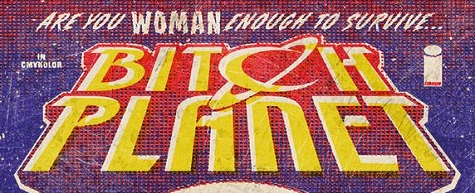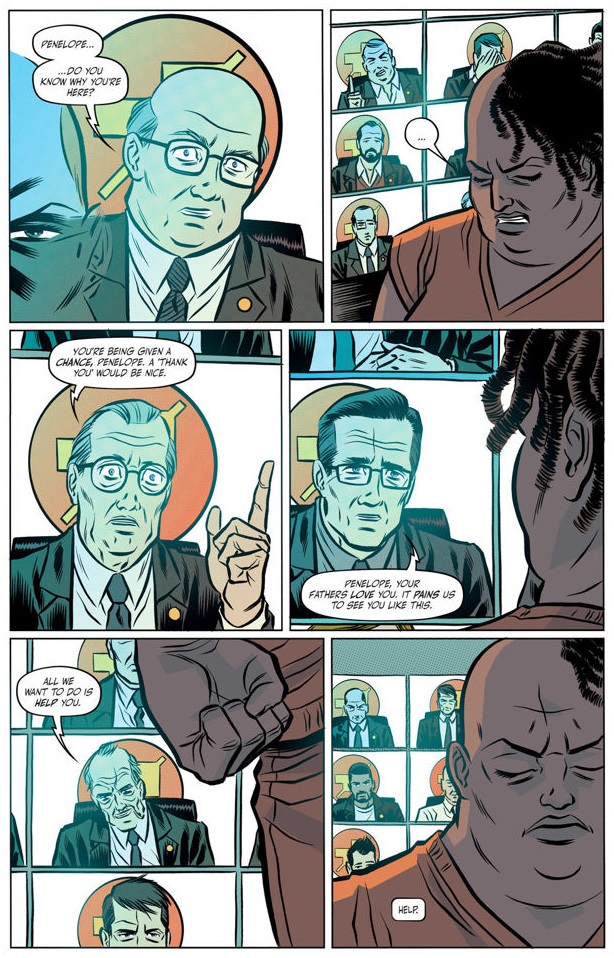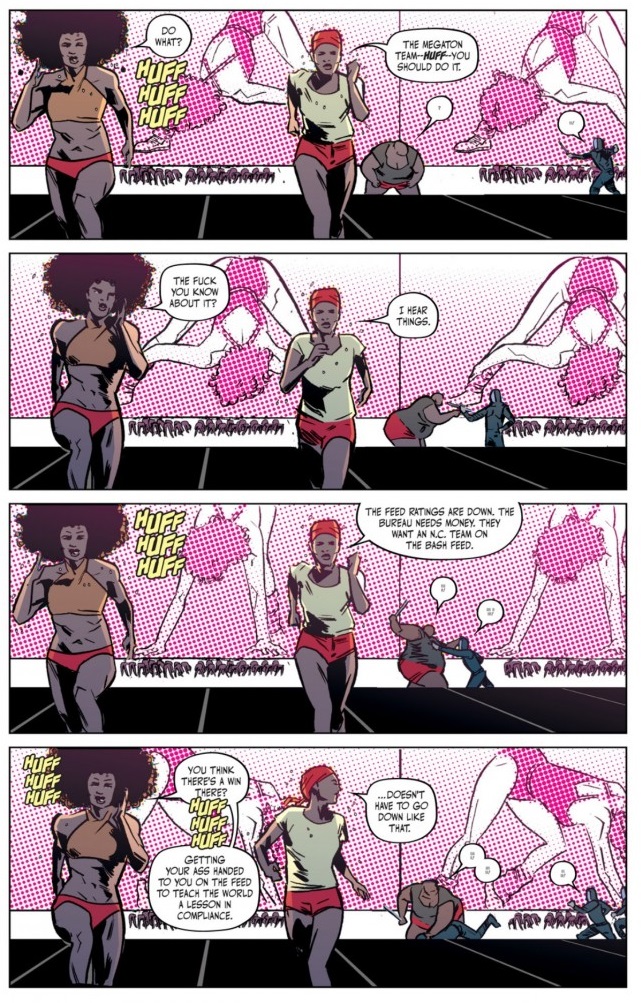Originally, this edition of Pull List was supposed to be all Kelly Sue DeConnick all the time as a co-review of Bitch Planet and Pretty Deadly. And then I read issue #3 and curled up in a cuddle puddle with my pet rat and cried for half an hour. I don’t even know how to explain everything, all the emotions that Penny’s history flooded up inside me, and even if I could it’s far more than this post could sustain. This review is rambling and wandering, but if you could manage to talk about a series like Bitch Planet and not get worked up emotionally then there is something terribly wrong with you.
Origin Story
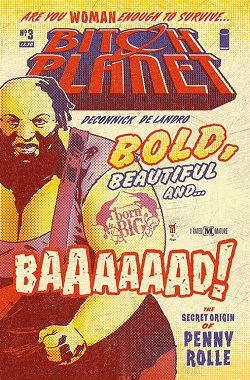 In a world set not too far in the future, moneyed white men run the show. White women are second class citizens too blinded by the struggles of trying to meet the demands of the ruling class that they can’t see how oppressed they really are. People of color and whites who can’t hack it are next down the ladder, and those whose non-compliance has become intolerable are so despised that they’re kicked off the planet entirely. They can’t be retrained or rehabilitated. They are a cancer on society, and Bitch Planet (aka Auxiliary Compliance Outpost) is where they will spend the rest of their days. Men run the outpost, of course, with the help of cruel Operative Whitney and a hologram of a nun tarted up in thigh highs, beestung lips, perfectly styled hair, corset-cinched waist, and an impossible thigh gap. All of the non-compliants are women, and nearly all of them are minorities. There are several subplots going on at any given moment, but the main thrust of the first arc is that a bunch of old rich white dudes have decided to use the inmates as fodder for their violent sports game, Megaton. The star of the series, Kamau Kogo, is offered the chance to pick her team and compete.
In a world set not too far in the future, moneyed white men run the show. White women are second class citizens too blinded by the struggles of trying to meet the demands of the ruling class that they can’t see how oppressed they really are. People of color and whites who can’t hack it are next down the ladder, and those whose non-compliance has become intolerable are so despised that they’re kicked off the planet entirely. They can’t be retrained or rehabilitated. They are a cancer on society, and Bitch Planet (aka Auxiliary Compliance Outpost) is where they will spend the rest of their days. Men run the outpost, of course, with the help of cruel Operative Whitney and a hologram of a nun tarted up in thigh highs, beestung lips, perfectly styled hair, corset-cinched waist, and an impossible thigh gap. All of the non-compliants are women, and nearly all of them are minorities. There are several subplots going on at any given moment, but the main thrust of the first arc is that a bunch of old rich white dudes have decided to use the inmates as fodder for their violent sports game, Megaton. The star of the series, Kamau Kogo, is offered the chance to pick her team and compete.
This is a story about women and feminism, but mostly about women of color and intersectionality. Published by Image Comics, Bitch Planet is written by Kelly Sue DeConnick (Captain Marvel, Pretty Deadly), with art by Valentine De Landro (X-Factor), colors by Cris Peters, and letters by Clayton Cowles. The first issue dropped December 2014, and there have been three so far (the fourth was delayed until April 8). Every third issue will feature a different artist (#3 is Robert Wilson IV) to give De Landro a break and will reveal the backstory of a different character. The series is inspired as much by 70s-era exploitation films and sci-fi futurism as it is by Margaret Atwood.
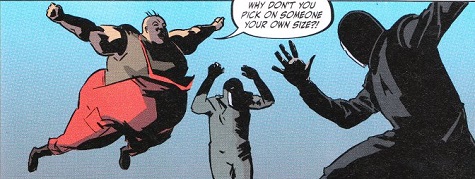
To Pull or Not to Pull
Issue #3 hit me hard. The previous ones were made of powerful stuff, but revealing Penny as biracial suddenly made her story, like, really personal. I’m Black with a splash of Cherokee on my mother’s side and white on my deadbeat dad’s side, and went through the same awful emotional shit Penny did as a kid. I am too white for Black people and too Black for white people. I’m light skinned, but that doesn’t do me much good because white people just tend to assume I’m white. When they find out I’m not I suddenly become either the Token Black Friend or they get pissed off at me as if I was trying to ride on their privileged coattails. As a kid I flat-ironed my curly hair—four hours a week, plus daily touch-ups—because I wanted pretty hair like all the white girls. The kids at school called me “chocolate milk” and “Oreo,” and I thought about trying to bleach away my freckles with lightening cream.
Back then you could only pick one option on most forms—you could be one specific ethnicity or “other.” For a few years I decided to be white for a while, but it felt like denying my mother’s existence, so I switched to “other,” which was even worse. When you’re “other,” you’re something weird, undefined, unacceptable. You don’t belong anywhere, no matter what you personally identify with. I was, just as Penny was, non-compliant. Feeling like you’re everything and nothing all at once is a profoundly terrifying experience, especially as a young adult. As women of color, we not only have to contend with cultural expectations of femininity, but also with trying to recalibrate ourselves to norms standardized for white women—double the pressure for half the fun. It wasn’t until I got out of my mostly-white hometown and into the ethnically diverse wonderland that is the East Bay that I discovered it was possible to be happy with my skin color, and not until I was well into my twenties that I finally actually learned to love myself and my body. I stopped caring that I don’t know how to put makeup on (anything more than eyeliner and mascara is out of my talent level). I stopped shaving. I stopped WonderBra-ing and high heel-ing and sex kitten-ing. I realized that I didn’t want to be compliant, I wanted to be happy.
Today I’m allowed to check all three boxes on forms. I identify as Black, but am multiracial and proud of it. I’ve had dates tell me they think it’s gross I don’t shave and I laugh and laugh and stick them with the tab. I’ve had my online dating profile bombarded with guys who feel it’s important to tell me they’ve always wanted to try a Black chick and I report their accounts for abuse. I take it as a compliment when some dudebro tells me I’m acting like a bitch or being too bossy. I’ve been too fat, too thin, my boobs too small, my nose too large. I couldn’t meet the requirements of a women’s magazine if my life depended on it. And I don’t want to. No one can make me hate myself. I rule me. I will not scrimp and scrape and diet and tan and enhance and surgically alter. Penny and I looked at our ideal selves in the mirror and saw the people we already are. I don’t want to be anything else but me.
Bitch Planet is a helluva comic book. Obviously issue #3 kicked my heart all over town, but the first two are nearly as powerful. The first issue is hands down the single best first issue of any comic book this year, and probably since Saga #1. It should be a surprise to absolutely no one that DeConnick’s script is fan-frakking-tastic. She couldn’t tell a bad story if she tried. De Landro’s art is heavy and intensely vicious. It’s pushed to even greater heights when paired with Peter’s vivid coloring and Cowles’ evocative lettering. Like Fiona Staples with Saga and Chip Zdarsky with Sex Criminals, De Landro never backs down from showing the human form in all its intimate glory but also keeps the artwork grounded in honesty. Bitch Planet is graphic but never pornographic or tawdry. The only thing obscene in this series is the world itself.
The ruling class shape society to benefit themselves, and the lower class (i.e.: people of color and anyone unlucky enough to annoy one of the privileged) suffer simply for not being like the ruling class. The middle class don’t fare much better, even if they think they do. White middle class women subject themselves to intestinal parasites, toilet scales, and trying not to piss off men, and they do it eagerly. They are unwilling or unable to see the world for the farce that it is precisely because they have the privilege of ignoring it. I could digress into the politics of this—as a WoC, pretty much my whole life revolves around dealing with this shit—but let’s just say the only people benefiting from the system are the rich old white dudes in charge. Feminism isn’t just about gender equality. It’s about racism, poverty, voting rights, trans and queer issues, access to education, cultural ignorance and societal boundaries, and a million other things. Bitch Planet gets that so hard. It’s not just representation that matters, intersectionality plays a huge part as well. Bitch Planet is too much of a wrecking ball to be an allegory for the real-world, but the parallels are there and they are about as unsubtle as it gets.
The series is seething and scathing. It’s commentary that doesn’t just bite but rends, lacerates, and mutilates. Bitch Planet is Orange Is the New Black minus Piper and set in the decades before A Handmaid’s Tale. It’s not a fantasy, it’s a cautionary tale. We’re already having these conversations. I guarantee you there’s not a single female-bodied person reading this that hasn’t been catcalled or been groped on mass transit, had to use the excuses “No thanks, I have a boyfriend” or “I’m a lesbian,” been followed by some creeper, or had to walk blocks out of the way just to avoid a harassment-heavy section of town. Bitch Planet is what happens when all that goes from being the norm to being mandatory and welcomed. All this is my way of saying thank you, Kelly Sue and Valentine, for giving me Bitch Planet. Women, WoC, QWoC, we all need this comic book. I revel in my non-compliance, and if you don’t like it, well, I don’t fucking care.
Alex Brown is an archivist, research librarian, writer, geeknerdloserweirdo, and all-around pop culture obsessive who watches entirely too much TV. Keep up with her every move on Twitter and Instagram, or get lost in the rabbit warren of ships and fandoms on her Tumblr.










